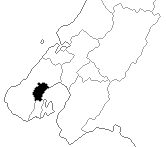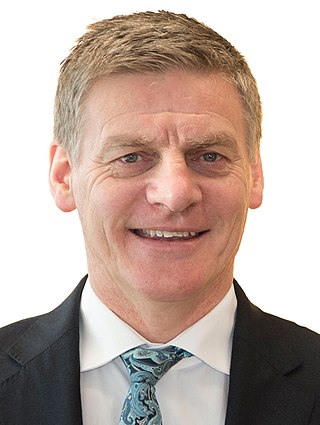Opinion polling was commissioned throughout the duration of the 43rd New Zealand Parliament in the lead up to the 1993 election by various research organisations.
Polls are listed in the table below in chronological order. Refusals are generally excluded from the party vote percentages, while question wording and the treatment of "don't know" responses and those not intending to vote may vary between survey firms.
Unless otherwise noted the information is sourced from here: [1]
| Poll | Date [nb 1] | Labour | National | Alliance | NZ First | NewLabour | Social Credit |
|---|---|---|---|---|---|---|---|
| 1990 election result [2] | 27 Oct 1990 | 35.14 | 47.82 | – | – | 5.16 | 0.98 |
| TVNZ Heylen | 8 Dec 1990 | 32 | 50 | – | – | 5 | 1 |
| TVNZ Heylen | 2 Feb 1991 | 38 | 46 | – | – | 4 | 2 |
| TVNZ Heylen | 9 Mar 1991 | 40 | 43 | – | – | 6 | 1 |
| TVNZ Heylen | 6 Apr 1991 | 42 | 36 | – | – | 6 | 1 |
| TVNZ Heylen | 6 May 1991 | 43 | 39 | – | – | 7 | 2 |
| TVNZ Heylen | 8 Jun 1991 | 42 | 35 | – | – | 7 | 3 |
| TVNZ Heylen | 6 July 1991 | 45 | 37 | – | – | 6 | 3 |
| 30 July 1991 – The controversial Mother of all Budgets was delivered by the government | |||||||
| TVNZ Heylen | 3 Aug 1991 | 43 | 34 | – | – | 9 | 1 |
| TVNZ Heylen | 31 Aug 1991 | 47 | 27 | – | – | 9 | 3 |
| TVNZ Heylen | 21 Sep 1991 | 42 | 22 | – | – | 11 | 1 |
| TVNZ Heylen | 19 Oct 1991 | 43 | 30 | – | – | 8 | 2 |
| TVNZ Heylen | 23 Nov 1991 | 41 | 24 | 10 | – | 9 | 2 |
| 1 December 1991 – The Alliance party was formally launched | |||||||
| TVNZ Heylen | 7 Dec 1991 | 36 | 26 | 21 | – | 6 | 1 |
| TVNZ Heylen | 1 Feb 1992 | 38 | 26 | 18 | – | 5 | 2 |
| 15 February 1992 – National narrowly wins the Tamaki by-election after Sir Robert Muldoon's resignation. | |||||||
| TVNZ Heylen | 7 Mar 1992 | 36 | 32 | 16 | – | 4 | 0 |
| TVNZ Heylen | 4 Apr 1992 | 39 | 31 | 10 | – | 4 | 3 |
| TVNZ Heylen | 29 Apr 1992 | 42 | 34 | 10 | – | 3 | 2 |
| TVNZ Heylen | 6 Jun 1992 | 42 | 33 | 21 | – | – | 1 |
| TVNZ Heylen | 3 Jul 1992 | 37 | 37 | 24 | – | – | 0 |
| TVNZ Heylen | 8 Aug 1992 | 41 | 36 | 20 | – | – | 1 |
| TVNZ Heylen | 5 Sep 1992 | 39 | 34 | 26 | – | – | – |
| TVNZ Heylen | 3 Oct 1992 | 42 | 30 | 27 | – | – | – |
| TVNZ Heylen | 7 Nov 1992 | 40 | 30 | 28 | – | – | – |
| TVNZ Heylen | 5 Dec 1992 | 36 | 29 | 33 | – | – | – |
| 12 December 1992 – Labour wins the Wellington Central by-election after Fran Wilde's resignation. | |||||||
| TVNZ Heylen | 6 Feb 1993 | 43 | 33 | 22 | – | – | – |
| TVNZ Heylen | 6 Mar 1993 | 46 | 28 | 22 | – | – | – |
| TVNZ Heylen | 3 Apr 1993 | 48 | 30 | 19 | – | – | – |
| 17 April 1993 – Winston Peters wins the Tauranga by-election as an independent candidate after resigning from both his party and his seat. | |||||||
| TVNZ Heylen | 1 May 1993 | 45 | 29 | 21 | – | – | – |
| TVNZ Heylen | 29 May 1993 | 40 | 29 | 26 | – | – | – |
| TVNZ Heylen | 3 Jul 1993 | 35 | 37 | 21 | – | – | – |
| 18 July 1993 – Peters founds the New Zealand First party and is joined by another former National MP Gilbert Myles. | |||||||
| TVNZ Heylen | 19 Jul 1993 | 33 | 40 | 11 | 12 | – | – |
| TVNZ Heylen | 8 Aug 1993 | 33 | 41 | 10 | 15 | – | – |
| TVNZ Heylen | 4 Sep 1993 | 36 | 39 | 11 | 11 | – | – |
| TVNZ Heylen | 2 Oct 1993 | 37 | 37 | 13 | 12 | – | – |
| TVNZ Heylen | 17 Oct 1993 | 34 | 38 | 16 | 10 | – | – |
| TVNZ Heylen | 31 Oct 1993 | 32 | 39 | 17 | 9 | – | – |
| 1993 election result [3] | 6 Nov 1993 | 34.68 | 35.05 | 18.21 | 8.40 | – | – |

New Zealand is a representative democracy in which members of the unicameral New Zealand Parliament gain their seats through elections. General elections are usually held every three years; they may be held at an earlier date at the discretion of the prime minister, but that usually only happens in the event of a vote of no confidence or other exceptional circumstances. A by-election is held to fill an electorate vacancy arising during a parliamentary term. The most recent general election took place on 14 October 2023.

The 1975 New Zealand general election was held on 29 November to elect MPs to the 38th session of the New Zealand Parliament. It was the first general election in New Zealand where 18- to 20-year-olds and all permanent residents of New Zealand were eligible to vote, although only citizens were able to be elected.

Referendums are held only occasionally by the Government of New Zealand. Referendums may be government-initiated or held in accordance with the Electoral Act 1993 or the Citizens Initiated Referenda Act 1993. Nineteen referendums have been held so far ; fourteen were government-led, and five were indicative citizen initiatives.

Wellington Central is an electorate, represented by a Member of Parliament in the New Zealand House of Representatives. The current MP for Wellington Central is Tamatha Paul of the Green Party. She has held this position since the 2023 general election.

The 2011 New Zealand general election took place on Saturday 26 November 2011 to determine the membership of the 50th New Zealand Parliament.
Opinion polling has been commissioned throughout the duration of the 49th New Zealand Parliament and in the leadup to the 2011 election by various organisations. The main four are Television New Zealand, TV3, The New Zealand Herald and Roy Morgan Research. The sample size, margin of error and confidence interval of each poll varies by organisation and date.
The 2011 New Zealand voting system referendum was a referendum on whether to keep the existing mixed member proportional (MMP) voting system, or to change to another voting system, for electing Members of Parliament to New Zealand's House of Representatives. It was held on 26 November 2011 in conjunction with the 2011 general election.

The 2014 New Zealand general election took place on Saturday 20 September 2014 to determine the membership of the 51st New Zealand Parliament.
Wellington, was a parliamentary electorate in Wellington, New Zealand. It existed from 1853 to 1905 with a break in the 1880s. It was a multi-member electorate. The electorate was represented, over the years, by 24 members of parliament.
Opinion polling for the 2014 New Zealand general election has been commissioned throughout the duration of the 50th New Zealand Parliament by various organisations. The five main polling organisations are Fairfax Media, MediaWorks New Zealand, The New Zealand Herald, Roy Morgan Research, and Television New Zealand. The sample size, margin of error and confidence interval of each poll varies by organisation and date.

The Tamaki by-election 1992 was a by-election held in the Tāmaki electorate during the 43rd New Zealand Parliament, on 15 February 1992. It was caused by the resignation of incumbent MP Sir Robert Muldoon and was won by Clem Simich with a majority of 1,252. The by-election was also notable as the first contested by the recently formed Alliance Party, and for their success in coming second ahead of the Labour Party.

The 1992 Wellington Central by-election was a by-election held in the Wellington Central electorate during the 43rd New Zealand Parliament, on 12 December 1992. It was caused by the resignation of incumbent MP Fran Wilde after her election as mayor of Wellington and was won by Chris Laidlaw with a majority of 855.

The 2017 New Zealand general election took place on Saturday 23 September 2017 to determine the membership of the 52nd New Zealand Parliament. The previous parliament was elected on 20 September 2014 and was officially dissolved on 22 August 2017. Voters elected 120 members to the House of Representatives under New Zealand's mixed-member proportional (MMP) voting system, a proportional representation system in which 71 members were elected from single-member electorates and 49 members were elected from closed party lists. Around 3.57 million people were registered to vote in the election, with 2.63 million (79.8%) turning out. Advance voting proved popular, with 1.24 million votes cast before election day, more than the previous two elections combined.

The Election Commission of India (ECI) is a constitutional body established by the Constitution of India empowered to conduct free and fair elections in India. The Election commission is headed by a Chief Election Commissioner and consists of two other Election Commissioners.
Several polling firms conducted opinion polls during the term of the 52nd New Zealand Parliament in the lead up to the 2020 general election, which elects the 53rd Parliament. The 52nd Parliament was elected on 23 September 2017 and dissolved on 6 September 2020. The 2020 election was originally due to take place on Saturday 19 September 2020, but due to a second COVID-19 outbreak it was delayed until Saturday 17 October 2020.
Opinion polling was commissioned throughout the duration of the 46th New Zealand Parliament in the lead up to the 2002 election by various organisations.
Several polling firms conducted opinion polls during the term of the 53rd New Zealand Parliament (2020–2023) for the 2023 New Zealand general election. The regular polls are the quarterly polls produced by Television New Zealand conducted by Verian and Discovery New Zealand (Newshub) conducted by Reid Research, along with monthly polls by Roy Morgan, and by Curia. The sample size, margin of error and confidence interval of each poll varies by organisation and date.
Opinion polling was commissioned throughout the duration of the 45th New Zealand Parliament in the lead up to the 1999 election by various organisations.
Opinion polling was commissioned throughout the duration of the 44th New Zealand Parliament in the lead up to the 1996 election by various research organisations.

The 2024 Indian general election was held in West Bengal in seven phases between 19 April and 1 June 2024 to elect 42 members of the 18th Lok Sabha. The result of the election was announced on 4 June 2024.